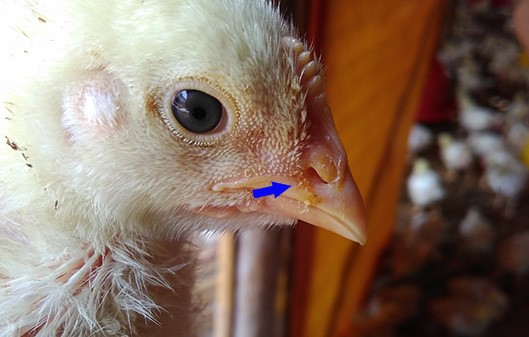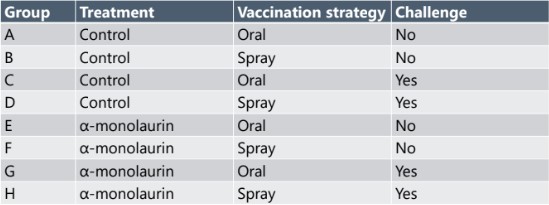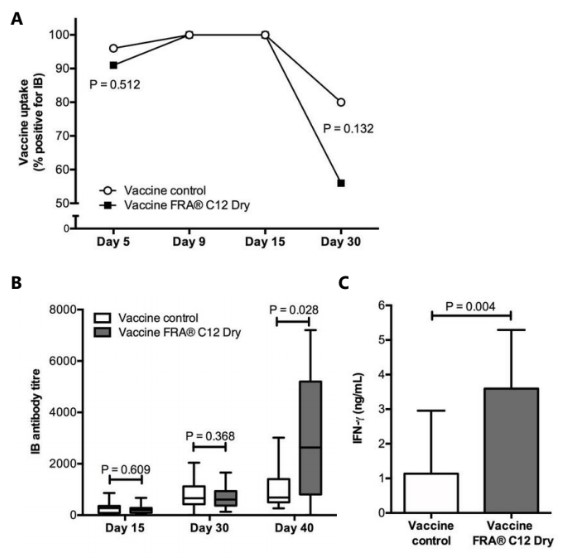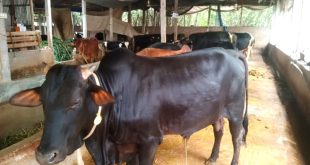Maarten De Gussem1*, Annelike Dedeurwaerder2, Isaura Christiaens2, Ellen P.C.W. Damen3, Olga Dansen3
1Vetworks bvba, Poeke, Belgium; 2Poulpharm bvba, Izegem, Belgium; 3Framelco BV, Raamsdonksveer, the Netherlands
Corresponding author: o.dansen@framelco.com
 INTRODUCTION : Alpha-monolaurin has been demonstrated to have antiviral and antibacterial properties and is therefore used as feed additive for broilers to prevent infectious diseases. Alpha-monolaurin is thought to exerts its antiviral effect by disintegrating the viral envelope. Therefore, the antiviral properties of α monolaurin might counteract with the current vaccination programs used in poultry production. In this study, the effect of a commercial available formulation of α-monolaurin (FRA® C12 Dry) on the efficacy of infectious bronchitis (IB) vaccination, as well as its effect on the immune response after IB vaccination was analyzed in Ross 308 broilers.
INTRODUCTION : Alpha-monolaurin has been demonstrated to have antiviral and antibacterial properties and is therefore used as feed additive for broilers to prevent infectious diseases. Alpha-monolaurin is thought to exerts its antiviral effect by disintegrating the viral envelope. Therefore, the antiviral properties of α monolaurin might counteract with the current vaccination programs used in poultry production. In this study, the effect of a commercial available formulation of α-monolaurin (FRA® C12 Dry) on the efficacy of infectious bronchitis (IB) vaccination, as well as its effect on the immune response after IB vaccination was analyzed in Ross 308 broilers.
RESEARCH QUESTIONS
◆ Is there an effect of α-monolaurin (FRA® C12 Dry) on the efficacy of IB vaccination in broilers?
◆ Is α-monolaurin (FRA® C12 Dry) able to enhance the immune response on IB vaccination in broilers?
MATERIALS & METHODS
Two separate trials were performed with approval of the animal ethics committee. Broilers (Ross 308) were obtained from a commercial hatchery in Belgium. Trial 1 lasted for 49 days and trial 2 for 40 days.
TRIAL 1:

◆ 8 treatment pens with 21 broilers each
◆ Day 2+12: Live attenuated IB vaccine (Nobilis IB 4/91®)
◆ Day 22: Intratracheal challenge with 100x higher vaccine dose
◆ Study parameters: BW, FI, FCR, IB titer values (ELISA)
TRIAL 2:

◆ 3 treatment isolators with 25 broilers each (Ross 308)
◆ Day 1+15: Live attenuated IB vaccine (Nobilis IB Ma5)
◆ Study parameters:
◇ BW, FI, FCR, mortality
◇ Vaccine uptake (IB RNA presence by qPCR)
◇ Vaccine response (IB titer by ELISA)
◇ Immune response (IFN-γ by ELISA)

RESULTS
TRIAL 1:
◆ All birds were protected upon challenge, indicating there was no negative effect of α-monolaurin on vaccination efficacy.
◆ Elevated IB titer values in orally vaccinated unchallenged birds receiving α- monolaurin (Figure 1), indicating a better vaccine uptake and/or immune response in the gastro-intestinal tract which is not induced upon vaccination via the respiratory tract.
TRIAL 2:

◆ In the negative control group, no IBV could be detected, whereas all birds in the other groups were tested positive for IBV at day 9 and day 15 (Figure 2A). This demonstrates there was no effect of α monolaurin on vaccine uptake.
◆ Enhanced clearance of the IB vaccine after 30 days in group C, suggested an increased immune response (Figure 2A), which is supported by increased IB titer values (Figure 2B) and significant increased IFN-γ level (Figure 2C), pointing to a more active immune system.
CONLUSION : The results demonstrate that α-monolaurin does not influence the IB vaccination efficacy and has the potency to improve the immune response. This further supports the use of α-monolaurin as a feed additive for broilers, not only by performance effects but also by an improved response on viral vaccination programs.
 Agrinews24 কৃষির সাথে, কৃষকের পাশে
Agrinews24 কৃষির সাথে, কৃষকের পাশে




















